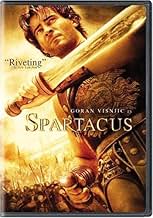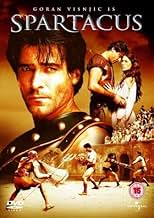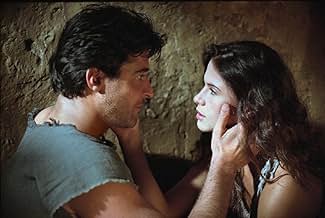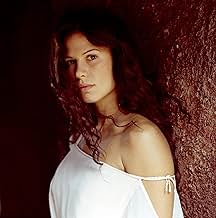Em uma Roma repleta de intrigas políticas, guerras civis entre aristocratas e provincianos, e lutas de arena, a expansão do Império é vital.Em uma Roma repleta de intrigas políticas, guerras civis entre aristocratas e provincianos, e lutas de arena, a expansão do Império é vital.Em uma Roma repleta de intrigas políticas, guerras civis entre aristocratas e provincianos, e lutas de arena, a expansão do Império é vital.
- Indicado para 1 Primetime Emmy
- 1 vitória e 7 indicações no total
Explorar episódios
Avaliações em destaque
There's some confusion about this Spartacus miniseries and the 1960 epic movie Spartacus. The stories are very similar because they both use the Howard Fast novel as a basis. The Kirk Douglas movie had another mission though as it was one of a group of movies made to regain the public's interest in the cinema with lavish spectacle. The scale of its production is much higher than the miniseries. What the miniseries has going for it is more historical accuracy; the gladiator/rebel army marched up Italy, got to the Alps and changed its mind (very puzzling), marched down to Italy's toe hoping to escape by boat but was foiled and was trapped for a time. They broke out only to quarrel amongst themselves and break up into at least two groups. This proved their undoing as the Romans first massacred the smaller group of Gauls and then defeated Spartacus in turn. Spartacus' body was never identified, but many were crucified along the road all the way to Rome. Spartacus and his army made the Romans pay in much blood and defeat leading up to his and their ultimate defeat, though, requiring 15 or 16 legions to chase them down. Spartacus is a favorite hero of the Communists, BTW, being the working stiff rising up against the ruling class, etc...
The 1960 epic is short on accuracy, instead showing the rebel army defeating the garrison of Rome and another legion or 3 along the way to Brundusium, only to turn back and get overwhelmed by multiple Roman armies. It was a closer match to the actual scale of events, as the rebels numbered around 90-100,000. But they both have the same love story tacked on along with treachery in the Roman Senate by ahistorical Roman Senators, and a Crassus obsessed with possessing the strength of Spartacus by possesing his woman.
The 1960 remains my favorite version simply because its a well-done big movie (I wouldn't want to be the one to reprise Olivier's Crassus!)although it was good to see a more accurate portrayal of the course of events shown in the miniseries. The acting was pretty good, with Spartacus' Visnjic a good choice for the title role.
The 1960 epic is short on accuracy, instead showing the rebel army defeating the garrison of Rome and another legion or 3 along the way to Brundusium, only to turn back and get overwhelmed by multiple Roman armies. It was a closer match to the actual scale of events, as the rebels numbered around 90-100,000. But they both have the same love story tacked on along with treachery in the Roman Senate by ahistorical Roman Senators, and a Crassus obsessed with possessing the strength of Spartacus by possesing his woman.
The 1960 remains my favorite version simply because its a well-done big movie (I wouldn't want to be the one to reprise Olivier's Crassus!)although it was good to see a more accurate portrayal of the course of events shown in the miniseries. The acting was pretty good, with Spartacus' Visnjic a good choice for the title role.
This was beautifully acted and when it was over I wanted more! However when the ending credits started to roll I was disgusted to see that Goran Visnijic's name was spelled Goren. Okay if you misspell Visnijic that's one thing but how hard is Goran? That seems awfully disrespectful and unprofessional. Where are the editors? There was a reminiscence of Braveheart especially since "Robert the Bruce" was opposite Goran for the spotlight here. And who could've missed the famous battle cry of "FREEDOM" when it was shouted? I loved Braveheart, I loved Spartacus and, what can I say I love Goran Visnijic. I think it's important these days to try and adequately and accurately portrait history's important events using television and movies because our children almost depend on it as a source of information. Using special effects and quality actors is a good start, thumbs up, but please fix your misspelling.
The original Spartacus is a superior movie as movies go. However, this version has much to offer and won't disappoint. The depiction of the Gladiator fights has several authentic touches such as the branding on the neck of the losing fighter. The brand was to insure the gladiator wasn't faking death! They still got the thumbs-down crowd signal wrong. In the movies, the thumbs-down means the crowd wants the loser to die. In reality the thumbs-down meant to let the loser live and to signal the victor to put down their sword. The death signal was a thumb stabbing motion toward the heart. I suppose they can be forgiven because few people watching the movie would know that and it would probably confuse most people to change it. They likewise included the signal of the losing fighter to plead for mercy, but got that wrong slightly too because the signal is one finger, not two. Still, they obviously tried to get things more accurate. The gladiator characters were quite accurate as were their weaponry and armor. Very good job there. They obviously paid attention to the discoveries made since "Gladiator" came out in 2000.
But the gladitorial combat scenes are a very small part of this movie. This is primarily a war movie and the war is a fight for freedom by slaves against the Roman empire. The producers retained much of the social commentary from Howard Fast's book. It fact they hit you over the head with it in case you didn't read the book. Most important in this the Draba character, the black gladiator who fights Spartacus. His role, though small, is key to the story. Also pay attention to Agrippa, the Roman Senator who is constantly making Crassius' life miserable. He's not what he seems, so pay attention.
Watching the mini-series on USA Network over two separate nights days apart is unbearable. But when commercials are edited out and you can watch the whole thing without so many interruptions, the narrative is quite fluid. This would make a nice DVD because the photography is good, the costumes detailed, the acting/casting good, and the story excellent.
It is just not the same movie as the 1960 version. Don't expect a simple remake. The ending is different. Spartacus' fate is different. It's more like Howard Fast wrote it originally than what Hollywood made of it in 1960.
The 1960 version is superb, but it's not the same as this movie. It's a similar but different story. I highly recommend this version along with the original.
But the gladitorial combat scenes are a very small part of this movie. This is primarily a war movie and the war is a fight for freedom by slaves against the Roman empire. The producers retained much of the social commentary from Howard Fast's book. It fact they hit you over the head with it in case you didn't read the book. Most important in this the Draba character, the black gladiator who fights Spartacus. His role, though small, is key to the story. Also pay attention to Agrippa, the Roman Senator who is constantly making Crassius' life miserable. He's not what he seems, so pay attention.
Watching the mini-series on USA Network over two separate nights days apart is unbearable. But when commercials are edited out and you can watch the whole thing without so many interruptions, the narrative is quite fluid. This would make a nice DVD because the photography is good, the costumes detailed, the acting/casting good, and the story excellent.
It is just not the same movie as the 1960 version. Don't expect a simple remake. The ending is different. Spartacus' fate is different. It's more like Howard Fast wrote it originally than what Hollywood made of it in 1960.
The 1960 version is superb, but it's not the same as this movie. It's a similar but different story. I highly recommend this version along with the original.
The TV miniseries opens in Gaul 72 B.C. where the Romans put an end to Varinia's world making her a slave
Meanwhile Spartacus (Goran Visnjic) is free from the hell of the gold mines of Egypt to be trained as gladiator in the establishment of Lentulus Batiatus (Ian McNeice).
Most of "Spartacus" contains many of the miniseries' best moments The operation of the gladiatorial school and its training program is impressive and expressive; the apprentice gladiators are treated like special animals, tutored to perform in the arena as spectator-sport-killers, and occasionally rewarded with a woman in their cells
In this degrading manner Spartacus meets Varinia (Rhona Mitra) and it is his love for her and his hatred for his captors that brings about his decision to escape and lead revolt
Particularly effective is the scene in which Marcus Crassus (Angus Macfadyen) and his bored entourage visit the establishment and request for a private showing at its best of a pair of Thracians Crassus wanted to see courage, passion, and above all finality
Spartacus is matched with the African Draba in a fight to the death, but Draba (maybe rather than live as a beast) chooses to die as a man, attacking his spectators
The scene summarizes the iniquity of the situation, the cruelty of bondage, and the subsequent uprising of gladiators in Capua becomes a triumph easy to understand
Director Robert Donrhelm did a decent job, carrying the grandeur and the decay of ancient Rome
Most of "Spartacus" contains many of the miniseries' best moments The operation of the gladiatorial school and its training program is impressive and expressive; the apprentice gladiators are treated like special animals, tutored to perform in the arena as spectator-sport-killers, and occasionally rewarded with a woman in their cells
In this degrading manner Spartacus meets Varinia (Rhona Mitra) and it is his love for her and his hatred for his captors that brings about his decision to escape and lead revolt
Particularly effective is the scene in which Marcus Crassus (Angus Macfadyen) and his bored entourage visit the establishment and request for a private showing at its best of a pair of Thracians Crassus wanted to see courage, passion, and above all finality
Spartacus is matched with the African Draba in a fight to the death, but Draba (maybe rather than live as a beast) chooses to die as a man, attacking his spectators
The scene summarizes the iniquity of the situation, the cruelty of bondage, and the subsequent uprising of gladiators in Capua becomes a triumph easy to understand
Director Robert Donrhelm did a decent job, carrying the grandeur and the decay of ancient Rome
In all fairness to the people who remade this movie, they had a difficult task ahead of them. Any remake of this story begs comparisons to Stanley Kubrick's masterpiece and when you come up against greats such as Olivier, Ustinov, Douglas and the old dude who played the fat senator you are going to come up short.
Nevertheless I was optimistic about this remake because I thought that new technology, modern film techniques and historical authenticity would make it fresh and vibrant. Kirk Douglas was too old and too "Anglo" to play the real Spartacus. The ER guy is definitely more ethnically accurate. I was also looking forward to seeing the actor who plays Crassus, who I thought was excellent in BraveHeart.
But I felt this version squandered much of the dramatic impetus of the Spartacus legend. Particularly disturbing was the whole George Bush/Marcus Crassus analogy that is not subtle at all. Crassus refers to Spartacus' slave army as "terrorists", talks about a "New World Order" and even uses the phrase "you're either with us or against us". I'm no fan of Dubya, but I found the overt preaching quite annoying and insulting; even worse, it took away from the story. Had it been somewhat more subtle, the way Kubrick's film deftly poked at McCarthy style conservatism I think that the story would not have lost out.
Nevertheless I was optimistic about this remake because I thought that new technology, modern film techniques and historical authenticity would make it fresh and vibrant. Kirk Douglas was too old and too "Anglo" to play the real Spartacus. The ER guy is definitely more ethnically accurate. I was also looking forward to seeing the actor who plays Crassus, who I thought was excellent in BraveHeart.
But I felt this version squandered much of the dramatic impetus of the Spartacus legend. Particularly disturbing was the whole George Bush/Marcus Crassus analogy that is not subtle at all. Crassus refers to Spartacus' slave army as "terrorists", talks about a "New World Order" and even uses the phrase "you're either with us or against us". I'm no fan of Dubya, but I found the overt preaching quite annoying and insulting; even worse, it took away from the story. Had it been somewhat more subtle, the way Kubrick's film deftly poked at McCarthy style conservatism I think that the story would not have lost out.
Você sabia?
- CuriosidadesA noticeable piece of dramatic license has Spartacus' son born exactly at the moment Spartacus dies in battle. As Marcus Crassus and Pompey Magnus are proclaimed co-consuls, the announcer calls Rome an empire, when it was still a republic at the time.
- Erros de gravaçãoWhen Spartacus is about to cut Crixus's throat, the fillings in Crixus's mouth are visible.
Principais escolhas
Faça login para avaliar e ver a lista de recomendações personalizadas
- How many seasons does Spartacus have?Fornecido pela Alexa
Detalhes
- Tempo de duração
- 1 h 27 min(87 min)
- Cor
- Proporção
- 1.78 : 1
Contribua para esta página
Sugerir uma alteração ou adicionar conteúdo ausente




































